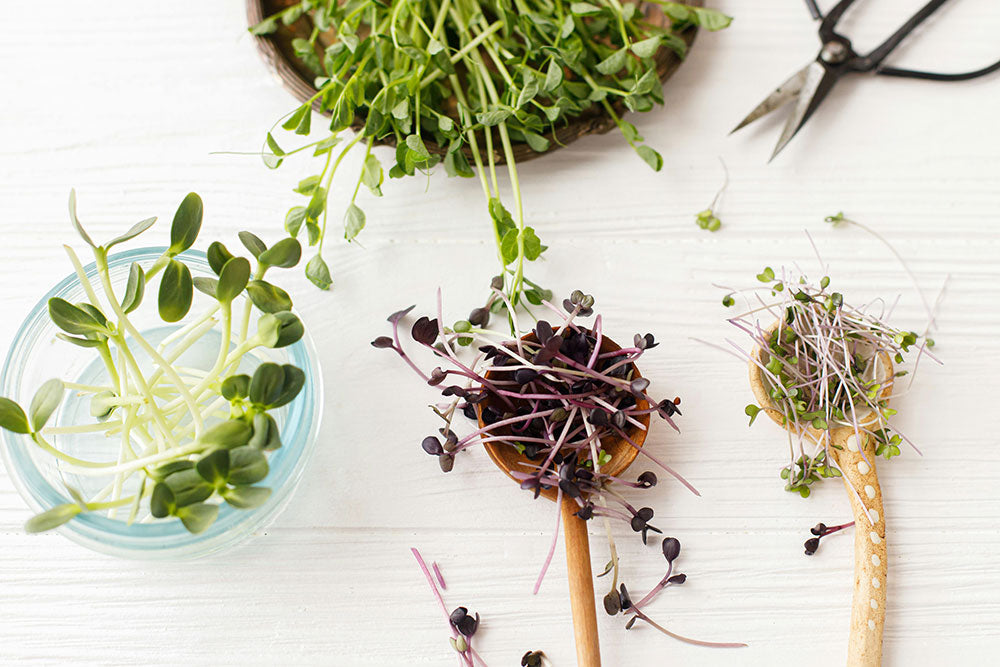It’s fun to grow your own food, but planning, planting, tending, and harvesting a big garden takes time. It also requires space. If you’re short on either, here are other ways you can grow your own food in a small space with minimal effort.
City living and busy lifestyles leave little room for a big garden. That doesn’t make fresh food any less important though. And tending some greens also acts as a balm to hectic schedules. Depending on your living space and other factors, consider:
- Container gardening
- A windowsill garden
- Sprouting
Getting started with container gardening
If you have a small balcony or patio that gets at least a little sun each day, try container gardening. You’ll be amazed at what you can grow in a small footprint.
Here are ten good container crops to try:
- Courgettes
- Tomatoes
- Beans
- Peas
- Potatoes
- Herbs (parsley, coriander, and basil are good choices)
- Peppers (bell and hot peppers)
- Lettuce, spinach, and other salad greens
- Leeks
- Salad onions.
You can sow many of these from February onwards, including salad greens, salad onions, peas, and beans. Follow-on crops such as leeks, courgettes, and carrots can be sown or transplanted when temperatures get too hot for more delicate leafy greens.
Watch out for: Wilting
Container gardens dry out fast. For leafy greens, herbs, and other leafy plants, this can stunt growth or kill the plant entirely. Ensure a regular water supply, asking a friend or neighbour to water your plants or by using automated irrigation if you’ll be away for a few days.
Grow your own windowsill garden
If you don’t have access to any outside garden space, a window ledge will do just fine to grow your own. Ideally, you’ll have a good size south-facing windowsill, or a west-facing one that gets plenty of sun.
If your windows don’t let in enough light for a garden, consider topping up light levels with an LED grow-light.
Ten excellent windowsill garden crops include:
- Basil, coriander, parsley, and other herbs
- Cherry tomatoes (try a hanging planter with tumbling tomatoes!)
- Lettuce and other salad microgreens
- Hot peppers
- Lavender, mint, and lemon balm for herbal teas at home!
- Pea shoots
- Baby beets
- Kale (try a small variety like Dwarf Blue)
- Ginger (try regrowing from fresh root!)
- Green onions.
Good choices for windowsill gardens include dwarf varieties of outdoor crops as well as crops that need more warmth year-round and wouldn’t fare well in the UK’s climate – like ginger!
Watch out for: Drainage
Windowsill gardens can dry out fast, but eager indoor gardeners may accidentally overwater to compensate. Make sure your containers have drainage holes, so the plants’ roots don’t sit in waterlogged soil.
Get serious about sprouting
When space and time really are at a premium, sprouting is the way to go to grow your own at home. Sprouting is also a fantastic way to pack a whole lot of nutrition into a small space.
In short, sprouting is the process of germinating seeds to produce young plants that you eat after just a few days to a week or so. This practice has a whole host of benefits and is perfect if you have little time, space, or resources.
Sprouts are:
- Nutritional powerhouses – each sprout is rich in vitamins, minerals, fibre, and enzymes that support digestion and overall health
- Available year-round – when other fresh foods are hard to grow at home, sprouts offer a continuous source of greens week after week
- Inconspicuous and space-saving – you can grow sprouts in just a jar in a small corner or spot on your windowsill
- Affordable – Fresh sprouts can cost a lot at the supermarket or health food store. Growing your own is much more cost effective (and fun!).
A beginner’s guide to sprouting
All you need to start sprouting are a few basic supplies and the right location:
- Seeds
- Container
- Water
- Light
When choosing seeds, look for those meant for sprouting and that haven’t been irradiated (which prevents sprouting). Good choices for seeds to sprout include:
- Alfalfa
- Broccoli
- Radish
- Lentils
- Mung beans
- Chickpees
For your container, you’ll want something with good drainage. You can get a specialised sprouting jar or just use a glass jar and a piece of cheesecloth or a tea strainer to rinse and drain the sprouts daily.
As for water, it’s best to use filtered water for sprouting. This is because chlorinated water can inhibit seed germination. If you don’t have a water filter, let tap water sit in a bowl or other open container for a few hours to allow the chlorine to evaporate.
Finally, while a sunny windowsill is best for sprouting, even indirect light works for many seeds. Artificial grow lights also work and are nice to have when dreary winter days leave your sprouts looking a little less green and flavourful than you’d like.
How to sprout seeds at home
Most packets of sprouting seeds come with their own instructions. It’s best to follow these carefully as each type of seed requires different care.
In general, though, here’s how to sprout seeds at home:
- Rinse your seeds under running water to remove any debris
- Soak the seeds for a few hours to kickstart germination (follow packet instructions)
- Drain the seeds, then rinse and drain again
- Transfer the seeds to your sprouting container
- Put the container somewhere warm (not hot) and dark
- Rinse and drain the seeds two to three times a day - this helps keep them moist and reduces the likelihood of mould growth
- When shoots appear, move your container into the light
- Rinse and drain the sprouts on the same schedule until they green up and are the size you want.
Most sprouting seeds are ready to harvest within 3-7 days! At this time, give them a final rinse, drain them well, and transfer them to a container for storage in the refrigerator.
Start another batch right away and you’ll have a near constant supply of fresh green sprouts to enjoy.
Check out our selection of sprouting supplies in store, including seeds for sprouting and easy-to-use sprouting trays, so you can always have a variety of sprouts on the go!


